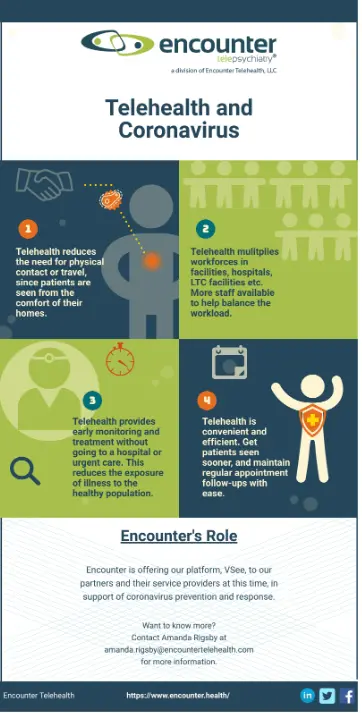With tensions mounting during the COVID-19 pandemic, there is an overwhelming demand for clinical resources. Telehealth is providing a unique solution in the prevention and management of coronavirus, and helping to ease the unspoken side effects.
Current Events
On Wednesday, the World Health Organization (WHO) officially declared COVID-19 a pandemic. With worldwide cases surpassing 130,000, and over 2,000 confirmed cases in the United States, our country is taking extreme and necessary precautions to reduce the spread of the virus. The president halted travel to Europe for the next 30 days, school and facility closures are in effect, and countless conferences and gatherings have been cancelled. And with the increase in cases, hospitals and clinics are receiving an overwhelming influx of concerned people. Staffing shortages that were present before the coronavirus panic, are becoming even more desperate among healthcare facilities.
Today in President Trump’s address to the public on the coronavirus pandemic, the federal government removed CMS restrictions on telehealth. This removes geographic limitations, and will allow telehealth providers to deliver care across the country with less red-tape. Furthermore, CMS has released a statement saying that they will soon ban non-essential visitors from nursing homes to protect our most at-risk populations: elderly and immunocompromised people.
What Can We Do?
As testing for COVID-19 becomes more readily available, we will likely see a steep increase of the number of people effected. It’s important to know your part in reducing the spread of the virus. WHO has released basic protective measures against coronavirus, and urges everyone to do their part. Here are the tips:
- WASH YOUR HANDS. This is the single most effective, preventative action again any virus. Did you know that proper hand drying is vital in the effectiveness of handwashing? Watch WHO’s video on proper hand-washing technique.
- MAINTAIN SOCIAL DISTANCING. Keep at least three feet between you and anyone that has been coughing, sneezing, or experiencing symptoms.
- AVOID TOUCHING EYES, NOSE, OR MOUTH
- PRACTICE RESPIRATORY HYGIENE AND COUGH ETIQUETTE. Cover your mouth and nose with a tissue or bent elbow when coughing or sneezing. This can help protect those around you.
- SEEK EARLY MEDICAL HELP. If you are experiencing a fever, cough, and difficulty breathing, call your medical professional in advance and seek help. Do not leave your home to seek help until calling in advance, this helps prevent the spread of the virus.
How Telehealth is Helping
During a pandemic, it can be extremely difficult to receive in-person medical treatment. Health organizations are urging people to call before coming into a clinic or hospital to prevent the virus from spreading. Telehealth is helping cross boundaries and provide treatment and services, without risk of contamination for the patient and/or the provider. Providers can continue care, evaluations, treatment, and management for patients without ever needing to come into physical contact with them. Telehealth also helps remove potentially infected patients from public healthcare centers, and keeps healthy individuals from risking potential transmission.
This is especially beneficial to residents in skilled nursing and long-term care facilities, as many have adopted lock-down measures in the wake of coronavirus. Provider shortages were already at an all-time high before the COVID-19 pandemic, and now they are being stretched even more. Telehealth allows the residents of these facilities to receive convenient and necessary medical assistance in the wake of lock-downs and quarantines, through secure video platform.

Encounter’s Role
Telehealth is also helping with the unspoken effects of COVID-19. Increased stress, anxiety, and panic have determined a greater need for mental healthcare. Encounter Telepsychiatry is helping address those needs by providing psychiatric care and counseling to our patients. The Center for Disease Control (CDC) published an article last week about mental health and coping techniques during the coronavirus pandemic. They remind the public that everyone reacts differently to stressful situations. Some of those reactions can include:
- Fear and worry about the health of loved ones and/or oneself.
- Changes in sleep or eating patterns
- Worsening of chronic health problems
- Increased use of alcohol, tobacco, or other drugs
- Anxiety and stress
- Feelings of loneliness
Many of our patients are residents in skilled nursing and long term care facilities. While on lock-down, only essential visitors are permitted, and they cannot receive visits from friends or family. This increases feelings of loneliness, which is already a major mental health concern.
Encounter is also working mindfully with our patients and their other medical providers to find solutions in during this tumultuous time. We are closely monitoring COVID-19, and will report any changes as they arise. Please follow us on social media for more current and up-to-date news and information.
Resources
The American Psychiatric Nurses Association (APNA) has compiled a list of helpful resources for the public, healthcare providers, and educators. Please visit their site by clicking HERE to learn more.
The World Health Organization is constantly providing updated information on COVID-19. View their website HERE.
The Centers for Disease Control and Prevention (CDC) are also providing up-to-date information. Visit their website HERE.


